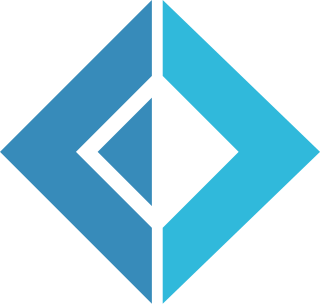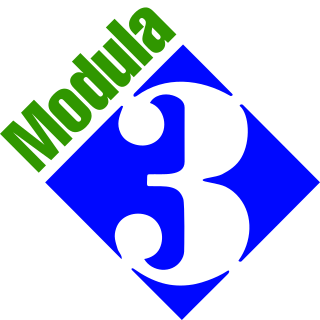
Erlang is a general-purpose, concurrent, functional high-level programming language, and a garbage-collected runtime system. The term Erlang is used interchangeably with Erlang/OTP, or Open Telecom Platform (OTP), which consists of the Erlang runtime system, several ready-to-use components (OTP) mainly written in Erlang, and a set of design principles for Erlang programs.
Prolog is a logic programming language that has its origins in artificial intelligence and computational linguistics.
Procedural programming is a programming paradigm, classified as imperative programming, that involves implementing the behavior of a computer program as procedures that call each other. The resulting program is a series of steps that forms a hierarchy of calls to its constituent procedures.
OCaml is a general-purpose, high-level, multi-paradigm programming language which extends the Caml dialect of ML with object-oriented features. OCaml was created in 1996 by Xavier Leroy, Jérôme Vouillon, Damien Doligez, Didier Rémy, Ascánder Suárez, and others.
In computer programming, a type system is a logical system comprising a set of rules that assigns a property called a type to every term. Usually the terms are various language constructs of a computer program, such as variables, expressions, functions, or modules. A type system dictates the operations that can be performed on a term. For variables, the type system determines the allowed values of that term. Type systems formalize and enforce the otherwise implicit categories the programmer uses for algebraic data types, data structures, or other components.
In computer science, declarative programming is a programming paradigm—a style of building the structure and elements of computer programs—that expresses the logic of a computation without describing its control flow.

F# is a general-purpose, strongly typed, multi-paradigm programming language that encompasses functional, imperative, and object-oriented programming methods. It is most often used as a cross-platform Common Language Infrastructure (CLI) language on .NET, but can also generate JavaScript and graphics processing unit (GPU) code.

Modula-3 is a programming language conceived as a successor to an upgraded version of Modula-2 known as Modula-2+. While it has been influential in research circles it has not been adopted widely in industry. It was designed by Luca Cardelli, James Donahue, Lucille Glassman, Mick Jordan, Bill Kalsow and Greg Nelson at the Digital Equipment Corporation (DEC) Systems Research Center (SRC) and the Olivetti Research Center (ORC) in the late 1980s.
In computer programming, an entry point is the place in a program where the execution of a program begins, and where the program has access to command line arguments.
ECLiPSe is a software system for the development and deployment of constraint logic programming applications, e.g., in the areas of optimization, planning, scheduling, resource allocation, timetabling, transport, etc. It is also suited for teaching most aspects of combinatorial problem solving, e.g., problem modeling, constraint programming, mathematical programming, and search techniques. It contains constraint solver libraries, a high-level modeling and control language, interfaces to third-party solvers, an integrated development environment and interfaces for embedding into host environments.
Haxe is a high-level cross-platform programming language and compiler that can produce applications and source code for many different computing platforms from one code-base. It is free and open-source software, released under the MIT License. The compiler, written in OCaml, is released under the GNU General Public License (GPL) version 2.
In computer programming, a pure function is a function that has the following properties:
- the function return values are identical for identical arguments, and
- the function has no side effects.
Logtalk is an object-oriented logic programming language that extends and leverages the Prolog language with a feature set suitable for programming in the large. It provides support for encapsulation and data hiding, separation of concerns and enhanced code reuse. Logtalk uses standard Prolog syntax with the addition of a few operators and directives.
This article describes the syntax of the C# programming language. The features described are compatible with .NET Framework and Mono.

Cython is a superset of the programming language Python, which allows developers to write Python code that yields performance comparable to that of C.
Nemerle is a general-purpose, high-level, statically typed programming language designed for platforms using the Common Language Infrastructure (.NET/Mono). It offers functional, object-oriented, aspect-oriented, reflective and imperative features. It has a simple C#-like syntax and a powerful metaprogramming system.

Ciao is a general-purpose programming language which supports logic, constraint, functional, higher-order, and object-oriented programming styles. Its main design objectives are high expressive power, extensibility, safety, reliability, and efficient execution.

Elm is a domain-specific programming language for declaratively creating web browser-based graphical user interfaces. Elm is purely functional, and is developed with emphasis on usability, performance, and robustness. It advertises "no runtime exceptions in practice", made possible by the Elm compiler's static type checking.

Nim is a general-purpose, multi-paradigm, statically typed, compiled high-level systems programming language, designed and developed by a team around Andreas Rumpf. Nim is designed to be "efficient, expressive, and elegant", supporting metaprogramming, functional, message passing, procedural, and object-oriented programming styles by providing several features such as compile time code generation, algebraic data types, a foreign function interface (FFI) with C, C++, Objective-C, and JavaScript, and supporting compiling to those same languages as intermediate representations.






